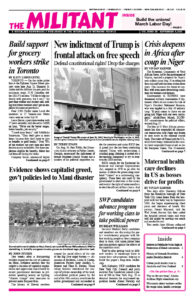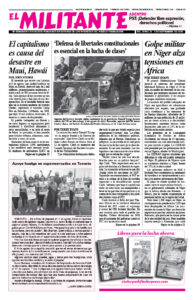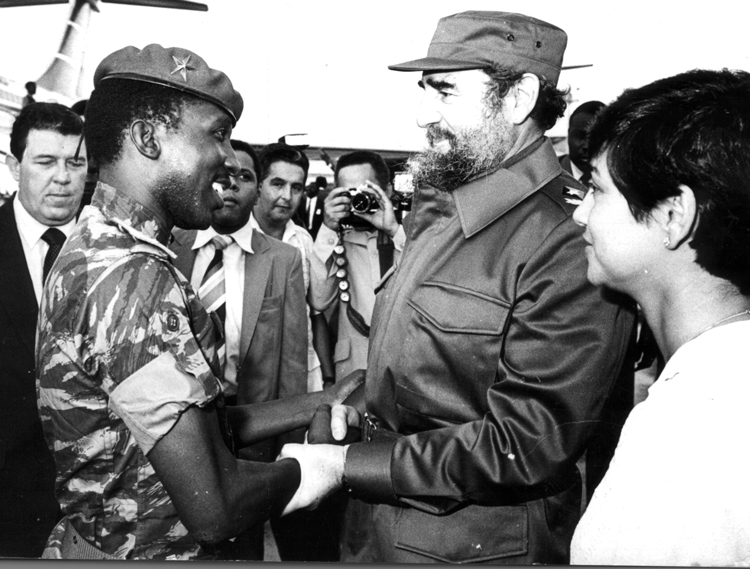Thomas Sankara Speaks is one of Pathfinder’s Books of the Month for August. Sankara was the outstanding leader of a revolution in Burkina Faso, one of the poorest countries in Africa, from 1983 to 1987. His speeches explain how the workers and peasants of this West African country established a popular revolutionary government and began to fight the hunger, illiteracy and economic backwardness imposed by imperialist domination, and the oppression of women inherited from millennia of class society. The excerpt is from Sankara’s Aug. 4, 1987, speech “Our revolution needs a people who are convinced, not conquered.” He was assassinated in a counterrevolutionary coup nearly 11 weeks later. Copyright © 2007 by Pathfinder Press. Reprinted by permission.
Comrades, the fourth anniversary of our revolution takes place under the banner of our dynamic peasantry. The peasantry — the community of those who solve the concrete question of food concretely every day for everyone.
Yes, it is this peasantry, emerging from the shadows of the Middle Ages and backwardness, that, under the most precarious conditions, beats the odds every year one way or another. This peasantry, our peasantry, makes up the largest part of our population. It is the part that has been subjected to — and continues to be subjected to — the most intense exploitation at the hands of the remnants of feudal-type forces and of imperialism. It is this part that has suffered the most from the ills we inherited from colonial society: illiteracy, obscurantism, pauperization, cruelty in many forms, endemic diseases, and famine.
So it comes as no surprise that our peasantry today is a force that wants change, revolutionary change, because only the revolution, by overturning the old order, can satisfy the peasantry’s legitimate aspirations. In order to respond to this legitimate desire and mobilize all available energies, the democratic and popular revolution has transformed the peasantry into an organized political force by creating the National Union of Peasants of Burkina. …
[T]he term peasant should cease to be the derogatory term we know today and should become a synonym for respect — the respect owed a proud and worthy combatant who defends just causes and who successfully meets the targets for his part in social production as a member of the great body that is the people.
The peasantry should not be left to fight this battle alone. The working class and the revolutionary, intellectual petty bourgeoisie should assume their historic responsibility, and work to reduce the gap between town and country through selflessness and sacrifice. The working class and the revolutionary, intellectual petty bourgeoisie should consider this celebration an important milestone in the process of strengthening their strategic alliance with the peasantry. Today is the festival of the peasantry and therefore of its allies, too — symbolized by our emblem, the emblem of the democratic and popular revolution. …
The democratic and popular revolution needs a convinced people, not a conquered people — a convinced people, not a submissive people passively enduring their fate. …
During the past four years of revolution, we have constantly had to confront reaction and imperialism. They have hatched the most vile plots aimed at hindering our work — or worse, at overthrowing our revolution. Imperialism and reaction are, and will remain, fiercely opposed to the transformations taking place every day in our country, threatening their interests.
Yet for the past four years our people have constantly proven that with the revolution, it’s possible to end exploitation, do away with misery, and create happiness for all through the power of our hands and hearts. Those living in luxury based on the exploitation of others have opposed our struggle and will do so even more tomorrow. …
Our revolution, just like others, is constantly threatened by all kinds of counterrevolutionary dangers. We must be conscious of this, highly conscious, and firmly commit ourselves to the permanent defense of the correct perspective that will guide us to the ultimate goal. Above all, we must be aware that these problems are created dialectically by the sharpening class struggle, and that, on the contrary, if there were no such problems, it would actually signify the underhanded suppression of the revolutionary struggle in favor of class collaboration.
Comrades, we must take time today to draw the lessons and learn from our past activity in order to enrich our revolutionary theory and practice, and deepen our commitment to the struggle in an organized, more scientific, and more resolute manner.
Many tasks — and complex ones — lie ahead of us. The enemies of our people and revolution have redoubled their energies and ingenious efforts to bar our road forward. And we’ll need more courage, more conviction, and more determination to keep marching forward. This determination and conviction will come, in part, from the lessons we’re able to draw from four years of struggle. … Yes, we need such an assessment.
In four years of revolution we’ve carried out many important revolutionary transformations. We’ve laid the basis for solving numerous problems facing our people. We’ve been very active throughout different sectors of our society. We’ve given the impression that we want to change everything, and do it immediately. We’ve been criticized sometimes, and we understand that very well. Furthermore, we ourselves have noticed that other important tasks have been neglected or downplayed. We must devote Year Five specifically to carrying out tasks of a political, ideological, and organizational character.
The deepening of our revolution and the future success of our political activity will depend on how well we solve these issues of organization and ideological orientation in our country. The revolution cannot go forward and achieve its goals without a vanguard organization able to guide the people in all its battles and on all fronts. Forging such an organization will require a big commitment on our part from now on.


